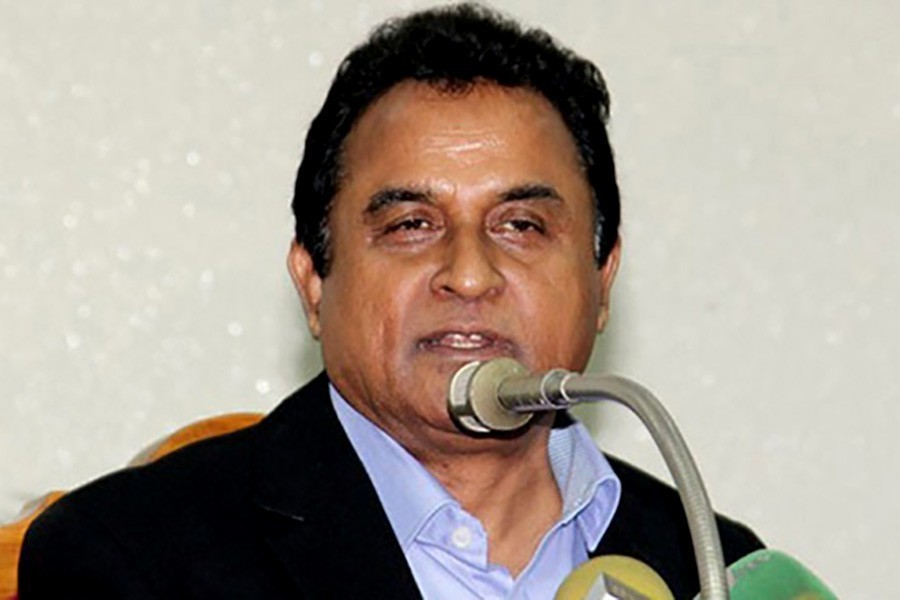FT Online
Published:2019-04-01 20:27:10 BdST
Kamal says Essential goods to see no VAT
Finance Minister AHM Mustafa Kamal said Sunday the essential commodities will be exempted from value added tax (VAT) when the new relevant law comes into effect in July.
He said the new VAT and supplementary duty (SD) act will have multiple rates instead of a single rate.
Mr Kamal's disclosure came at a meeting with resident representative of the International Monetary Fund (IMF) in Dhaka Ragnar Gudmundsson at his Sher-e-Bangla Nagar office in the capital, according to a statement.
Under a condition attached to the IMF's budgetary support credit worth US$1.0 billion, the government passed the new law in 2012. The main feature of the new law was the introduction of a single rate of VAT.
However, the government could not enforce the new law in the face of fierce resistance from the business community.
Mr Kamal said using electronic fiscal device will be made mandatory under the new law to prevent VAT evasion.
Buyers will pay the price of products using electronic cash register, which will keep daily and monthly account of VAT, he said.
It will help stop the scope for dodging VAT by the collectors, he added.
He noted a good number of people will have to be employed for running the electronic cash machines, which will bring down the unemployment in the country.
Referring to Bangladesh's low debt-GDP (gross domestic product) ratio, the minister said this highlights the stability of the country's economy.
Mr Kamal said despite ongoing global economic slowdown, the GDP growth of the country reached over 7.0 per cent led by continuous success of the government during the last 10 years.
He said the growth will 'reach 7.86 per cent in fiscal year 2018-19'.
The minister said the government has planned to provide job to cent per cent people having working capacity by 2025.
If this kind of employment can be generated, the rate of poverty will come down to 16 per cent.
The IMF representative Mr Gudmundsson said Bangladesh has done well in social safety net with decline in inflation and rise in foreign currency reserves.
He, however, noted that revenue shortfall remained "significant."
On the day, the minister also had a meeting with country director of the World Bank Robert J Saum at his office.
Mr Kamal said Bangladesh is now a country of bright prospect where foreign businessmen can invest confidently.
"Our capability has increased significantly and now we can negotiate with lenders. So, the World Bank and other development partners are eager to offer loans," he said.
The minister expressed the hope that the World Bank would scale up its assistance to Bangladesh in the coming days.
In the meeting World Bank's country director praised Bangladesh for economic growth, women employment and empowerment, says the statement.
Meanwhile, exchanging views with the representatives of the private sector on the day, the finance minister said the next budget will be placed in parliament on June 13.
In the new budget, he hinted at rationalising tax rates.
"Currently, some people are paying too much tax while others are paying nothing. But we want to bring everyone under the tax net," the minister said.
Saying that there would be multiple VAT rates, he noted those would be 5.0 per cent, 7.5 per cent, and 10 per cent.
But the rate will vary from item to item, the minister said after holding a meeting with the private sector representatives in the capital.
"We will decide it later on which item is going to have what kind of VAT rates," Mr Kamal said.
"We hope that the new rates will increase the government's revenue collection many times," he added.
Noting that Bangladesh's tax-GDP ratio is less than 10 per cent, the finance minister said, "For a country like us, the tax-GDP ratio should be around 15 to 16 per cent."
"The only way to increase our tax-GDP ratio is to increase our revenue from VAT," he observed.
Meanwhile, the meeting proposed increasing the VAT-free turnover ceiling to Tk 5.0 million from 3.6 million, participants informed later.
The meeting also proposed raising the upper limit of 3.0 per cent turnover tax to Tk. 30 million.
Currently businesses with an annual turnover of Tk. 8 million are eligible for such a turnover tax.
Chairman of the National Board of Revenue Md. Mosharraf Hossain Bhuiyan and private industry and investment advisor to the Prime Minister Salman F Rahman also spoke at the meeting.
Leaders from various business chambers and top representatives from the private sector attended the meeting.
Unauthorized use or reproduction of The Finance Today content for commercial purposes is strictly prohibited.


